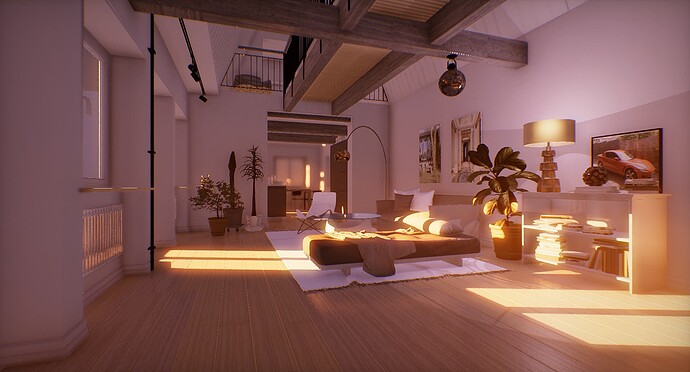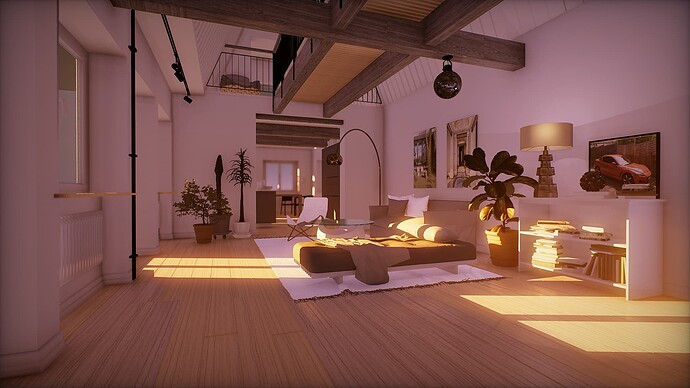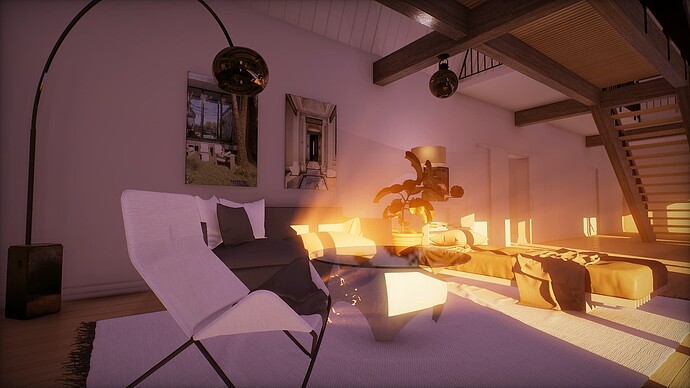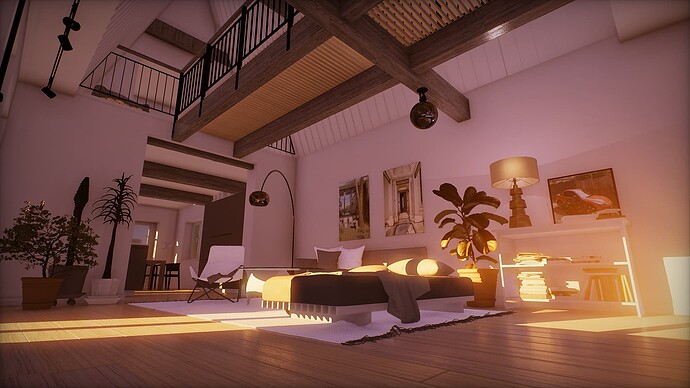I have tested Flax with a small test scene from evermotion used for my work and I’m really impressed by the quality of the render pipeline :).
This is not simple to param the shadows correctly, I have scaled my scene to 0.01 to reduce the shadows acne but the result is really correct.
I think this engine is really promising !
A litle more advanced texturing and render in Flax !
I love the rendering of this engine 
Thanks Flax’s team !!!
Wow, that looks amazing!
I have reworked a litle the source code of Flax to have a better shadowmap quality and super sampling for best rendering and that work perfect.
I have decided to use this engine for my project, I think it’s the best and the license system is really that I need.
Now is time to work and stop playing with the editor :).
I think post my project in the right categories of the forum in the next few months.
Thanks
What kind of game are you planning on making
Hi, this is not a game but a 3D application.
This is complicated because Flax use a system editor and this is not practical for my purpose.
Actually, i’ll try to modify the source code to use Flax without editor (to run directly in a window )…Not simple task for loading materials, meshes, shaders…
Hi. I’m using Flax for the first time, and hoping to make something wonderful.
Realtime GI is a feature I was hoping to see, as well as wind.
Do you know if these will become part of the Flax Engine anytime in the near future?
Can you tell me what besides these features, make Flax less capable for a commercial 3D game?
The reason I ask is because I want to make commercial games, and I came to Flax, because I wanted a lightweight engine, as Unreal Engine (since the 21st century) is too powerful for my pc.
I didn’t try Unity, and I don’t like Godot enough.
However, Flax feels a bit like Unreal… at least in some areas.
Hello, there! Welcome to the Flax community! 
I’ve been using Flax Engine since version 1.1. I’ve made several small projects to get familiar with it and I’ve released a couple of them as open-source projects, such as CharacterControllerPro.
Flax Engine will get real-time GI once version 1.4 drops. It’s already been developed. If you want to try it, download the master branch of the engine off of GitHub. As for wind, it’s already on their physics roadmap. If you really need it, I’m sure the developers would try to get it ready by 1.5 or 1.6.
I’ve rarely encountered any deal-breaking things in Flax that keep me from using it. It’s a very well-rounded engine that has most of the tools you could need to make a game. Anything you need that’s not in the engine is probably on their public roadmap. There isn’t really anything I can think of that truly prevents one from creating a commercial game with it.
However, there are a few glaring rough edges where Flax Engine is noticeably less powerful or easy to use than Unreal Engine. If you’re coming from Unreal, I’m assuming you primarily use Blueprint to code your games. Flax Engine’s Visual Script is powerful, but not anything like Blueprint. And there are some issues with it. For example, referencing another Visual Script in the scene causes the whole engine to crash, Visual Scripts cannot inherit each other, and a crash occurs if you connect 2 reroute nodes together. These 3 issues have been preventing me from releasing a Visual Script project.
The bright side, though, is that you’re not stuck with C++ like in Unreal. Flax Engine also supports C#, which in my opinion is probably the best way to code a game. It works very well. The C# API is almost identical to Unity’s at a high level. Flax Engine also supports live C++, like Unreal. If you’ve used C++ in Unreal, you’ll be able to figure out C++ in Flax in most likely 2 hours. It works similar on a higher level, but it’s actually way cleaner and simpler to use. And the C++ compile times are sometimes even faster than the C# ones! (Less than 2 seconds).
As for non-scripting areas, let’s start with the UI tools. The UI tools on Flax are actually surprisingly powerful, but the editor tools to create them are nonexistent. You’ll be doing all your UI designing in the Properties window. And there’s no dedicated window for looking at and designing UIs. You’ll be doing all of that in the Game window.
Flax Engine’s animation tools feel rough around the edges as a whole, but you can still use it to create some powerful stuff. It’s just not as polished or as feature rich as Unreal, but it’s still miles better than Unity’s in my opinion.
Flax Engine’s docs cover almost everything about the engine. But how well they cover a topic varies quite a bit. Some parts like the physics areas are covered quite well, but other areas are so under-documented that it makes them impossible to use without looking at Flax Engine’s source code to figure out what’s going on. Creating custom animation nodes is one example.
Finally, if you plan on having some terrain and vegetation in your game, those tools still feel a bit more like Unity’s terrain than Unreal’s. It’s still a basic tool, but they plan on improving it.
I can’t really think of any other big issues. Any other issue you have with the engine will depend more on your own game. However, Flax Engine is not all cons. Let’s talk about some things that make it better than Unreal.
First, like you already said, the editor feels sooooo much faster and lighter than Unreal’s. And that’s coming from someone with a fairly decently powerful computer. However, you will probably still need a fairly decent GPU, as some users have been experiencing some issues with Intel iGPUs.
Second, Unreal Engine is a gargantuan application. There is always a feature that you don’t know how to use, simply because there are so many. Flax Engine is not like that. It feels much easier than Unreal to achieve a similar result in a lot of things.
Almost any Unity tutorial can be applied to Flax. That’s a huge plus, and effectively makes it have more tutorials than Unreal.
Flax Engine is also genuinely fun to use. It feels less like a powerful beast that you have to tame to get the right results and more like a toolbox that you can use to build whatever you can imagine. I love using it.
I’ve just kind of skimmed over some of the pros and cons I’ve found with the engine. It’s a very viable tool that’s improving at an incredible rate. And because the community is so small, the developers can focus on implementing and improving the features that we need. For example, @mafiesto4 began work on the real-time GI system almost immediately after we asked for it. I have a feeling that if you really need wind, you’ll get it sooner rather than later. The devs of this engine are awesome.
Others can drop a post about their experiences here, too. I’m not a graphics programmer, so if that’s your line if work, I’m afraid I’m not able to give my opinion in that area. I’m also not that good of a 3D artist, so others can probably give better feedback on those tools than me. If you’d like to read more about my opinion on Flax, you can read this post.
Finally, I suggest just trying the engine. Spend a month or two with it making small games and decide if it’s a good fit for you. It might not fit your use case, or it could pleasantly surprise you.
Thanks very much.
You told me everything I needed to know.
Flax Engine will get real-time GI once version 1.4 drops. It’s already been developed.
As for wind, it’s already on their physics roadmap. If you really need it, I’m sure the developers would try to get it ready by 1.5 or 1.6.
Great to hear that.
…it’s still miles better than Unity’s in my opinion.
It feels much easier than Unreal to achieve a similar result in a lot of things.
There is no reason I shouldn’t use it then, since I am looking for the most lightweight engine, that can still be up there with the ‘big boys’. 
Almost any Unity tutorial can be applied to Flax. That’s a huge plus, and effectively makes it have more tutorials than Unreal.
 That’s really encouraging!
That’s really encouraging!
Can you give an example of how to do that?
For example, @mafiesto4 began work on the real-time GI system almost immediately after we asked for it. I have a feeling that if you really need wind, you’ll get it sooner rather than later. The devs of this engine are awesome.
That’s good to hear.
Yes, wind is definitely something I would be overjoyed with 

 , considering the project I have drafted.
, considering the project I have drafted.
I was thinking I might have to use bones with animations, but that would be a lot of bones… and work.
A bit of wind and some vertex painting would do the job just fine.
Thanks a lot, for this encouragement. I now feel there is hope. 
@Spectrix I forgot to mention, thanks very much for the foot IK with CharacterControllerPro. I love it! Very useful. I can see that coming in handy with four footed creatures as well. Good work! 
Sure! I haven’t personally tried to make this in Flax, but this Unity tutorial for a Rigid Body character controller looks like something that you could follow in Flax. You’d just have to know the differences with a few functions, names, and scene structure. Besides that, most of the C# code is a literal copy-paste job.
Thanks very much! And you’re very welcome! I’m so glad it could help! Feel free to use it in any project you might have!
Flax Geek already did a tutorial on how to create some wind in Flax using a Material: How To Add Wind To Foliage in Flax Engine 1.3 - YouTube
Yes I saw that, but it’s not what I am looking for. I have a trained eye, and it picks up monotony quite easily. I’m aiming for a more realistic feel in my project. Thanks though.
No problem. I’m afraid I can’t help you, then. I’m not a shader guy. 
That’s okay. I’ll wait a bit. Hopefully it’s implimented by Flax 1.6.
If not, I have a few projects I can work on in the meantime.
I also started looking at CryEngine, which isn’t as taxing as Unreal. I could give that a shot with that particular project.
I’ll still work with Flax though. The experience with this game engine could be fun.
Hopefully I can finish a project before the next game engine to compete comes out. 
I am wondering, if I start a project using 1.3, how easy is it to migrate that project to a later version, like 1.4… 1.5… 1.6…?
@Jillinger I’ve never experienced any breaking changes when upgrading between versions, but it’s still a good idea to create a backup before upgrading. The Launcher will do that automatically when you try to open a project with a different editor version.
Okay, thanks. I’ll just go ahead, and start creating then.
Have fun! I wish you a good experience! 





